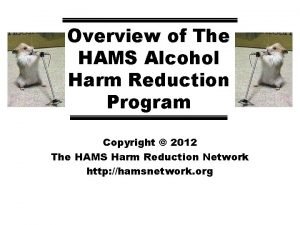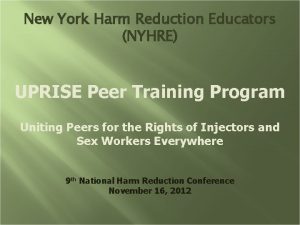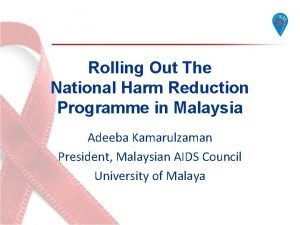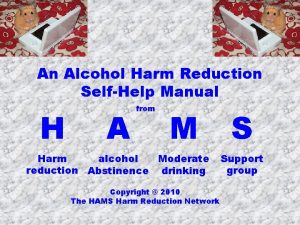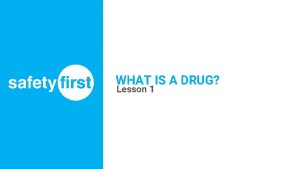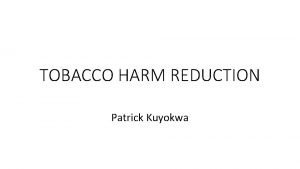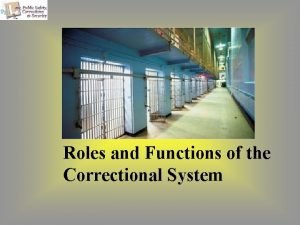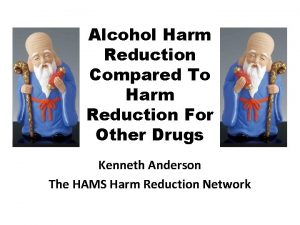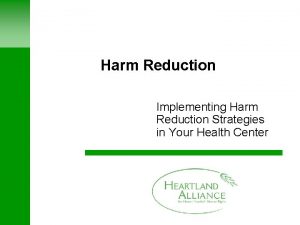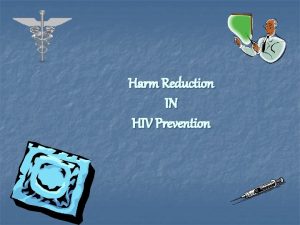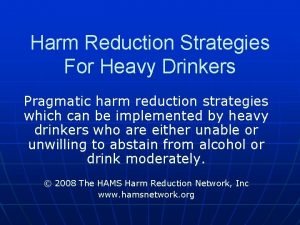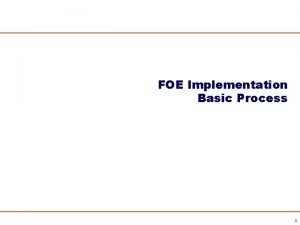Harm reduction friend or foe Correctional officers and
















- Slides: 16

Harm reduction friend or foe? Correctional officers and prison based needle and syringe programs o Emily van der Meulen, Ph. D, Department of Criminology, Ryerson University o Rai Reece, Ph. D, Justice Services Program, Humber College o Sandra Ka Hon Chu, LLM, Canadian HIV/AIDS Legal Network

BACKGROUND “…have education that is mandated on injection drug use as well as maybe speaking to somebody who has been a drug user… understand the actual nature of addiction not the perceived moral issue” (Prison in reach worker and former prisoner, Northern Ontario). • PNSPs reduce needle sharing, overdoses, abscesses, and both HIV and HCV • Prison health issue (injection drug use) and health care service (PNSPs) = improved access to and implementation of harm reduction programs • Qualitative study with former prisoners in Ontario, and medical and community professionals. Developed with PASAN (Prisoners HIV/AIDS Support Action Network), and the Canadian HIV/AIDS Legal Network

GOALS • To elucidate the challenges related to improving prisoners’ health as well as staff occupational safety. • Determine which PNSP model would be most supported by prisoners in Canada • Develop recommendations based both on the evidence and on prisoners’ experience of incarceration and knowledge of injection drug use.

PNSP MODELS • Dispensing Machine • Distribution by Peer Workers • Distribution by NGO or External Personnel • Distribution by Prison Health Care Staff • Nurses • Doctors • Medical Technicians

KEY FINDINGS • Decades of empirical evidence has shown PNSPs: • • reduce the re use of drug injection equipment; reduce HIV and HCV transmission; do not lead to increased drug use, including IDU; increase referrals to drug treatment programs; reduce abscesses and overdoses; do not lead to needles being used as weapons; do not result in increased altercations between prisoners or against prison staff; • do not result in increased needle stick incidents; • do not result in increased seizures of illegal drugs or drug using paraphernalia.

DISPENSING MACHINES “With a machine… you can go there undetected, not very many people would know that you are using. ” (Interview #6) “The only one who can fill [the dispensing machine] is the health care system and if its empty and there is no health care at night then we are doomed, right? ” (Interview #7)

CORRECTIONAL OFFICER RESISTANCE AND RHETORIC • UCCO represents 7, 400 + federal correctional officers across the country • Union president Jason Godin has stated that scholars and prisoner rights advocates are “completely out of touch with reality” (4) • In response to lawsuit Godin stated: “These people don’t have any understanding of what our community is like behind the walls, ” suggesting that a PNSP would be “more dangerous for inmates and staff” as it would be “introducing a potential weapon, ” and prisoners would abuse or take advantage of the program (5) • Premise also echoed by previous Ministers of Public Safety, who have expressed the same concern (6)

• In over twenty years of functioning PNSPs, including in prisons that are maximum security, with high levels of institutional violence, and are significantly over crowded, there has not been a recorded incident of a needle being used as a weapon against staff or other prisoners • CO union is a vocal opponent to PNSPs, and individual officers can feel pressure to conform to union views officers, wardens and other administrative staff.

• CO’s play a significant role in the success or failure of programs such as PNSPs “You need to educate them, get to the union. ” (Indigenous prison in reach and community harm reduction worker, Southern Ontario) • Our aim was to initiate dialogue in order to advance prisoners’ health and human rights while also improving employee workplace safety • PNSPs do not compromise prison security or contribute to violence (1)

“If you don’t get buy in from CSC and the guards union we’re screwed. ” (Prison in reach worker, British Columbia) “Once you get the head of the unions to buy into it – it doesn’t have to be every member – once you get the head of the union, the top dog, to buy into it then that will trickle down. ” (Prison in reach worker, Eastern Ontario)

SHIFT THE IDEOLOGY, IMPLEMENT THE PROGRAM “if you could get correctional workers from jurisdictions that have implemented PNSPs and have a knowledge exchange session between them that might actually make a difference” (Prison doctor and infectious disease specialist, Eastern Ontario). “Have some of the union fellows attend to explain it to them. You can demonstrate that anywhere it’s been implemented, those fears have been there. Other staff in other countries have had the same fears and concerns, but they’ve been unfounded. If we could make them understand that this is not something to be feared then we would be a lot farther” (Prison in reach worker, Eastern Ontario).

GLOBAL RESPONSES TO PNSPS • Germany: prison staff were vocal critics of the government’s decision to abolish PNSPs and lobbied to have them reinstated (2) • Hindelbank prison in Switzerland: prison staff underwent a full year of training and educational workshops to increase their knowledge of PNSPs prior to implementation • Once introduced, staff had some apprehension, but were not resistant, and there has been a high level of staff support for the program ever since (3) • Australia (AMC): COs threatened to walk off the job if a planned PNSP was implemented. As a result, it has been indefinitely stalled, with the CO union exercising a veto power in their labour agreement against PNSPs

CURRENT RESPONSES TO PNSPS • In May 2018, CSC announced the implementation of “prison needle exchange programs” (PNEPs) in two federal prisons (GVI and Atlantic), with a plan to roll these out across all federal prisons beginning in 2019 • COs from both GVI and Atlantic have filed labour complaints in relation to the PNEPs, alleging that it will endanger staff health and safety • There is a lawsuit currently underway to compel CSC to implement PNSPs as a matter of prisoners’ constitutional rights to security of the person and equal treatment before and under the law

PRISON HEALTH IS PUBLIC HEALTH • Federal government obligations: uphold its commitment to a “comprehensive, collaborative, compassionate and evidence based approach to drug policy” (7), • Charter of Rights and Freedoms obligations: the Canadian government’s stated approach to drug policy and harm reduction, and international law, such as the recently adopted UN Mandela Rules, stipulate that prisoners enjoy the same standards of health care that are available in the community and are entitled to continuity of treatment and care, including for infectious diseases and drug dependence (UN General Assembly 2015).

PRISONHEALTHNOW. CA On. Point@ryerson. ca

AUTHOR CONTACT INFORMATION • Emily van der Meulen: Ryerson University, Criminology, Toronto • evandermeulen@Ryerson. ca • Rai Reece: Humber College, Toronto • rai. reece@humber. ca • Sandra Ka Hon Chu: Canadian HIV/AIDS Legal Network, Toronto • SChu@aidslaw. ca
 Hello my friend friend of a friend
Hello my friend friend of a friend Hello my future
Hello my future Friend or foe? (game show)
Friend or foe? (game show) Friend or foe chapter 2
Friend or foe chapter 2 Friend or foe station lab answers
Friend or foe station lab answers Hams alcohol
Hams alcohol New york harm reduction educators
New york harm reduction educators Harm reduction programme
Harm reduction programme Harm reduction worksheets
Harm reduction worksheets Harm reduction strategies
Harm reduction strategies Harm reduction
Harm reduction To have a friend you must be a friend
To have a friend you must be a friend Foaf a matic
Foaf a matic A friend in needs a friend indeed
A friend in needs a friend indeed I've found a friend oh such a friend
I've found a friend oh such a friend Roles and functions of the correctional system
Roles and functions of the correctional system Ffa vice president symbol
Ffa vice president symbol





